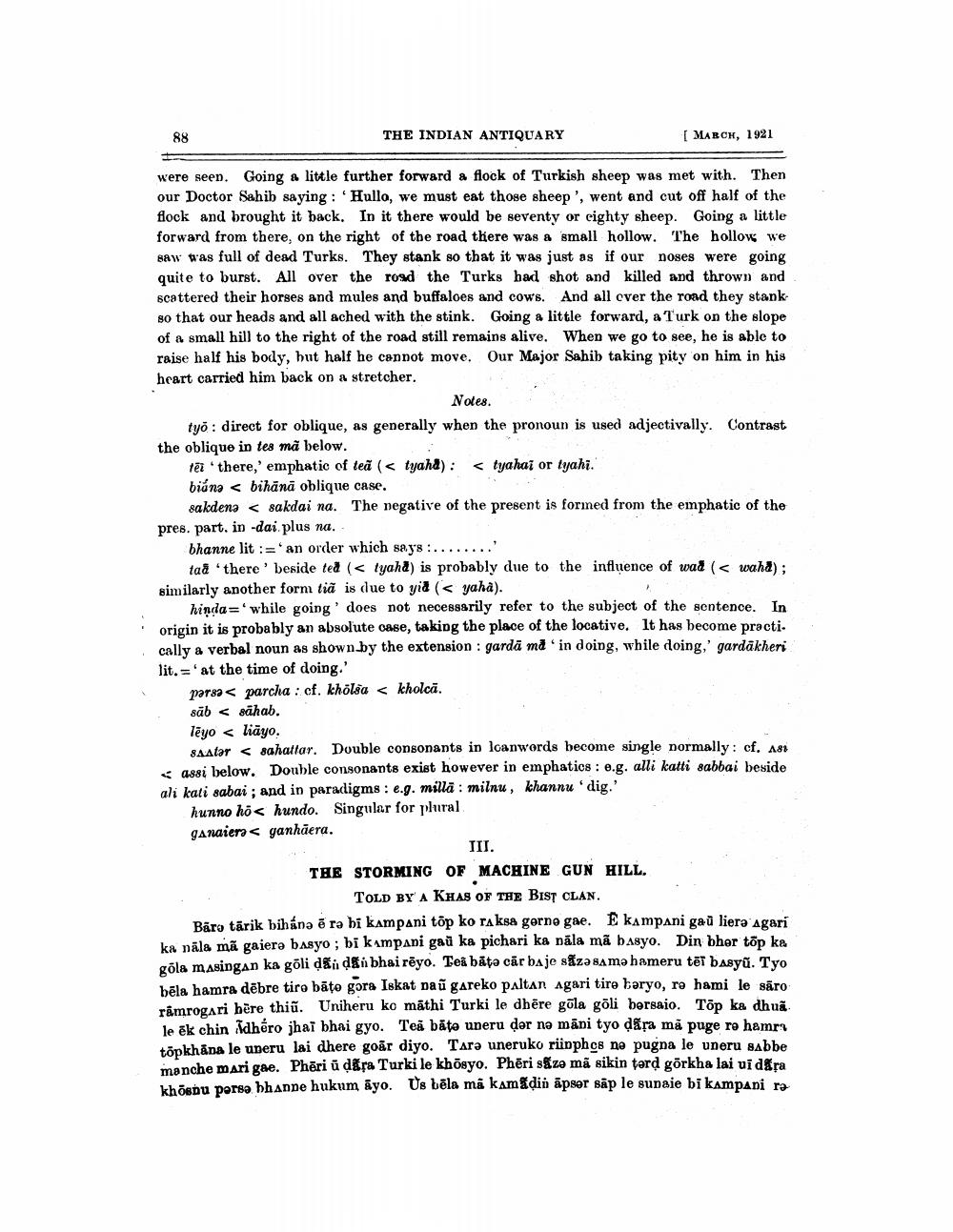________________
88
THE INDIAN ANTIQUARY
I MARCH, 1921
were seen. Going a little further forward a flock of Turkish sheep was met with. Then our Doctor Sahib saying: 'Hullo, we must eat those sheep', went and cut off half of the flock and brought it back. In it there would be seventy or eighty sheep. Going a little forward from there, on the right of the road there was a small hollow. The hollow we saw was full of dead Turks. They stank so that it was just as if our noses were going quite to burst. All over the road the Turks had shot and killed and thrown and scattered their horses and mules and buffaloes and cows. And all over the road they stank. so that our heads and all ached with the stink. Going a little forward, a Turk on the slope of a small hill to the right of the road still remains alive. When we go to see, he is able to raise half his body, but half he cannot move, Our Major Sahib taking pity on him in his heart carried him back on a stretcher.
Notes. työ: direct for oblique, as generally when the pronoun is used adjectivally. Contrast the oblique in tes mã below.
tēt there,' emphatic of teã (< tyaha): < tyahai or tyahi. biána < bihānā oblique case.
sakdena < sakdai na. The negative of the present is formed from the emphatic of the pres. part. in -dai plus na.
bhanne lit : =' an order which says:........
tad 'there' beside ted (< tyaha) is probably due to the influence of wad (< waha); similarly another form tiã is due to yid (< yaha).
hinda='while going does not necessarily refer to the subject of the sentence. In origin it is probably an absolute case, taking the place of the locative. It has become practi. cally a verbal noun as shown by the extension : gardā md in doing, while doing,' gardākheri lit. =' at the time of doing.'
parsas parcha : cf. khölza < kholcā. sāb < sähab. lēyo < liayo.
saator s sahattar. Double consonants in loanwords become single normally: cf. A81 Sassi below. Double consonants exist however in emphatics : e.g. alli katti sabbai beside ali kati sabai ; and in paradigms: e.g. millā: milnu, khannu 'dig.'
hunno hos hundo. Singular for plural ganaieros ganhāera.
III. THE STORMING OF MACHINE GUN HILL.
TOLD BY A KHAS OF THE BEST CLAN. Bāro tärik bihánə ē ra bi kampani top ko raksa gerne gae. E kampani gau liero agari ka näla mã gaiere basyo; bi kampani gau ka pichari ka näla mã basyo. Din bher top ke Rõla masingan ka gõli di du bhai rēyo. Tea băta căr baje sáza samo hameru tēt bagyű. Tyo bela hamra dëbre tiro bāto gora Iskat paū gareko paltan Agari tire baryo, re hami le sāro ramrogari böre thiữ. Uniheru ko mathi Turki le dhëre gola goli bersaio. Tõp ka dhui le ek chin Kahéro jhai bhai gyo. Teå bāto uneru dor no mani tyo dara må puge re hamra topkhana le uneru lai dhere goar diyo. Tarə uneruko riipphes ne pugna le uneru sabbe manche mari gae. Phēri û d&ra Turki le khõsyo. Phēri sáze mã sikin terd görkha lai ui d&ra khõbu persa bhanne hukum āyo. Us bēla má kam&dii apser sāp le sunaie bi kampani ra




